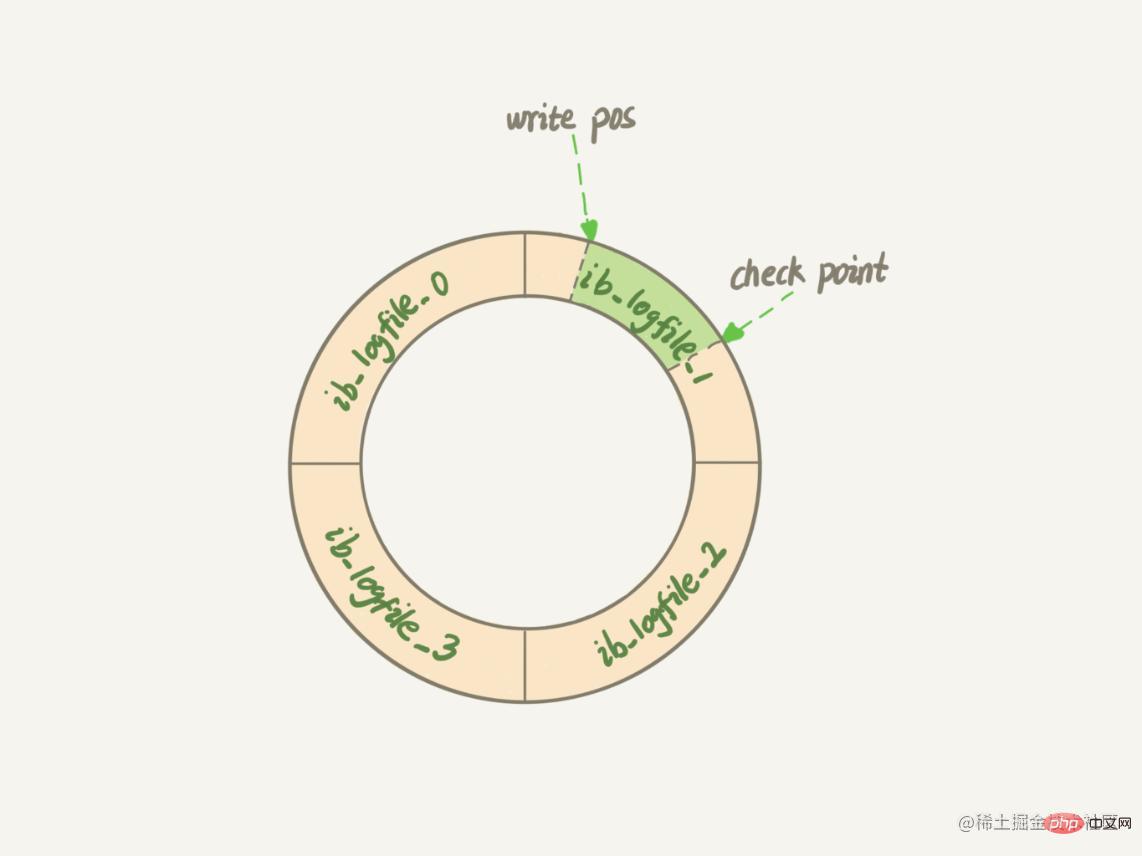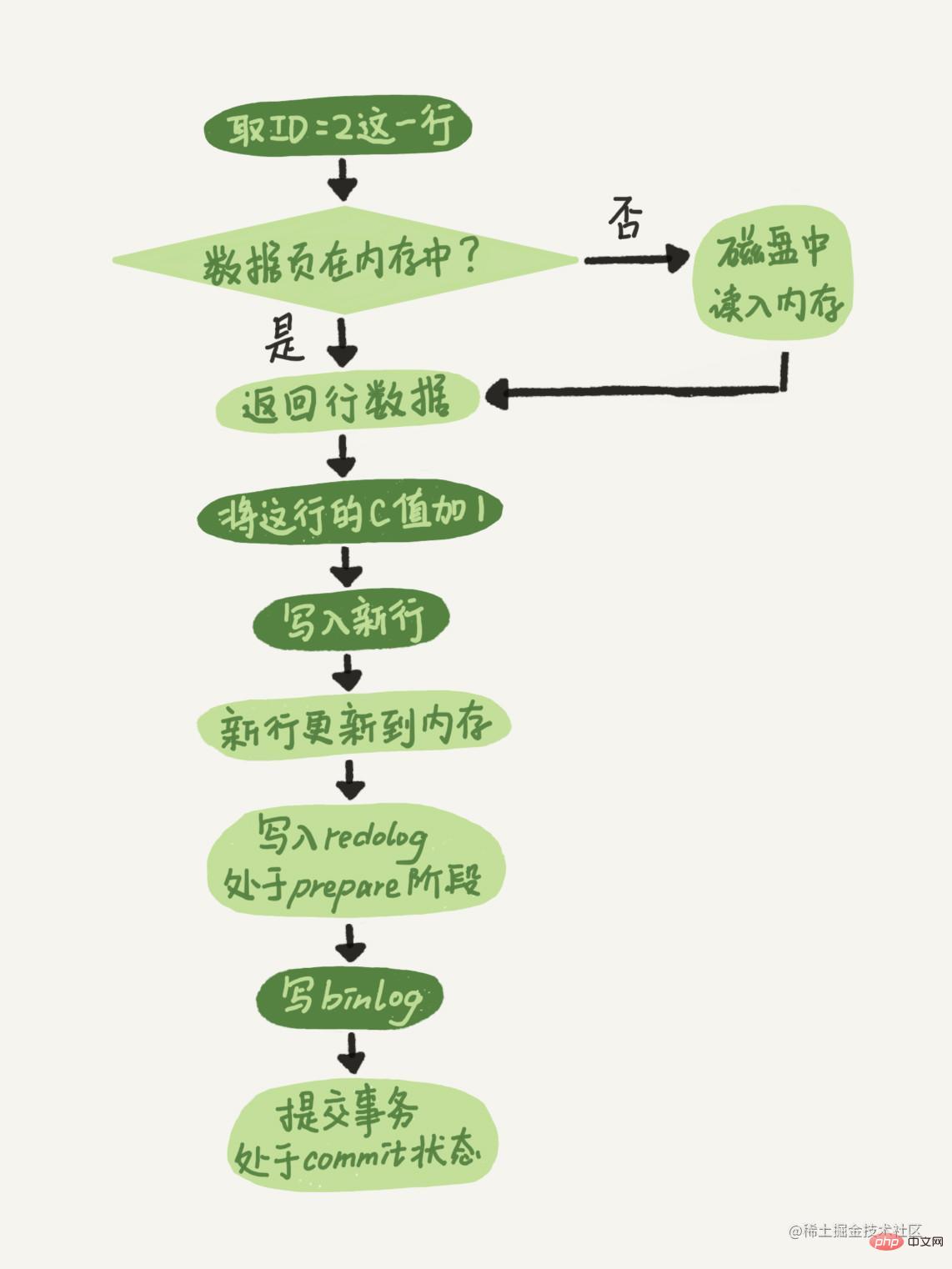Interviewer: Let's talk about MySQL's two-phase submission mechanism.
This article will take you to understand the two-phase submission mechanism of MySQL, introduce the redo log and bin log, and see how they cooperate to complete the two-phase submission. I hope it will be helpful to everyone!

MySQL ensures the logical consistency of redo log and bin log through the two-stage submission mechanism, thereby ensuring that data is not lost and the data in the master-slave database is consistent.
Speaking of two-phase submission, we have to introduce redo log and bin log first.
redo log
redo log is a redo log, which is a log unique to the InnoDB engine (some interviewers often ask about this).
What does redo log mainly do?
Take updating data as an example. We know that MySQL data is stored on the disk. If every time the data is updated, it goes to the disk to find the data to be updated and performs the update operation. The IO cost will be is very high.
It’s okay if it’s a solid-state drive, but if it’s a mechanical hard drive, then MySQL’s update performance simply cannot meet our business needs.
So, MySQL uses a technology called WAL, Write-Ahead Logging.
When updating data, the update operation (that is, what modifications are made on a certain data page) is first written to the redo log, and then the memory is updated. This update operation is completed. MySQL will flush redo log operation records to disk when the server is idle to maintain data consistency.
It should be noted that although the redo log is also a file on the disk, because the operation is written sequentially, the performance is very high.
Of course, the redo log also has a size limit, and unlimited writing is impossible.
The above figure is an example. Four redo logs are configured. Write pos represents where the current record is written, and check point represents a As it advances, it will continue to move forward and erase data to ensure that the redo log can continue to be written.
Of course, before erasing data, the redo log records will be flushed to disk.
Through redo log, you can ensure that even if MySQL restarts abnormally, the data will not be lost (because redo log is a physical log and can be replayed). This feature is called crash-safe.
bin log
Bin log is a log provided by MySQL Server, called archive log. All engines can use bin log.
What is the difference between bin log and redo log?
1. The providers of these two logs are different: bin log is provided by MySQL Server, and redo log is unique to the InnoDB engine.
2. The redo log mainly records the modifications made to a certain data page. The bin log records the original logic of the statement, such as updating a certain field of a certain row.
3, redo log is written in a loop, and the data will be overwritten. Bin log is appended. When one file is full, the next file is written.
Two-phase submission
After introducing redo log and bin log, let’s take a look at how they cooperate to complete two-phase submission.
The above picture is a process of updating data. You can see that before updating a piece of data, MySQL will first load the data into the memory, and then Update the memory and start writing redo log.
At this time, the redo log is in the prepare state. After the bin log is written, and then the transaction is submitted, the update operation of this record is completed.
redo log prepare -> Write bin log -> redo log commit, this process is called two-stage commit.
Let’s analyze the benefits of using two-stage submission.
Scenario 1: When the redo log is in the prepare state, if writing to the bin log fails, the update fails. At this time, the redo log has no commit and the bin log has no records. The status of the two is consistent and there is no problem. .
Scenario 2: When the redo log is in the prepare state, the bin log is written successfully, but the commit fails due to downtime. At this time, the bin log generated a record, the redo log was not written successfully, and the data was temporarily inconsistent.
But don't worry, when MySQL restarts, it will check the records in the prepare state in the redo log. In the redo log, a field called In fact, if the writing is not successful, the submission will be given up.
Through this mechanism, the consistency of redo log and bin log is guaranteed.
Summary
The reason why there are both redo log and bin log in MySQL is because the bin log is an archive log provided by MySQL Server, which itself does not have crash-safe capability. The redo log itself does not have the ability to archive. It is a log written in a loop.
MySQL ensures data consistency by integrating these two logs and using a two-stage submission mechanism.
Writing is not easy, thank you for your likes and attention.
[Related recommendations: mysql video tutorial]
The above is the detailed content of Interviewer: Let's talk about MySQL's two-phase submission mechanism.. For more information, please follow other related articles on the PHP Chinese website!

Hot AI Tools

Undresser.AI Undress
AI-powered app for creating realistic nude photos

AI Clothes Remover
Online AI tool for removing clothes from photos.

Undress AI Tool
Undress images for free

Clothoff.io
AI clothes remover

AI Hentai Generator
Generate AI Hentai for free.

Hot Article

Hot Tools

Notepad++7.3.1
Easy-to-use and free code editor

SublimeText3 Chinese version
Chinese version, very easy to use

Zend Studio 13.0.1
Powerful PHP integrated development environment

Dreamweaver CS6
Visual web development tools

SublimeText3 Mac version
God-level code editing software (SublimeText3)

Hot Topics
 1378
1378
 52
52
 MySQL: The Ease of Data Management for Beginners
Apr 09, 2025 am 12:07 AM
MySQL: The Ease of Data Management for Beginners
Apr 09, 2025 am 12:07 AM
MySQL is suitable for beginners because it is simple to install, powerful and easy to manage data. 1. Simple installation and configuration, suitable for a variety of operating systems. 2. Support basic operations such as creating databases and tables, inserting, querying, updating and deleting data. 3. Provide advanced functions such as JOIN operations and subqueries. 4. Performance can be improved through indexing, query optimization and table partitioning. 5. Support backup, recovery and security measures to ensure data security and consistency.
 MySQL: Simple Concepts for Easy Learning
Apr 10, 2025 am 09:29 AM
MySQL: Simple Concepts for Easy Learning
Apr 10, 2025 am 09:29 AM
MySQL is an open source relational database management system. 1) Create database and tables: Use the CREATEDATABASE and CREATETABLE commands. 2) Basic operations: INSERT, UPDATE, DELETE and SELECT. 3) Advanced operations: JOIN, subquery and transaction processing. 4) Debugging skills: Check syntax, data type and permissions. 5) Optimization suggestions: Use indexes, avoid SELECT* and use transactions.
 How to open phpmyadmin
Apr 10, 2025 pm 10:51 PM
How to open phpmyadmin
Apr 10, 2025 pm 10:51 PM
You can open phpMyAdmin through the following steps: 1. Log in to the website control panel; 2. Find and click the phpMyAdmin icon; 3. Enter MySQL credentials; 4. Click "Login".
 How to create navicat premium
Apr 09, 2025 am 07:09 AM
How to create navicat premium
Apr 09, 2025 am 07:09 AM
Create a database using Navicat Premium: Connect to the database server and enter the connection parameters. Right-click on the server and select Create Database. Enter the name of the new database and the specified character set and collation. Connect to the new database and create the table in the Object Browser. Right-click on the table and select Insert Data to insert the data.
 MySQL and SQL: Essential Skills for Developers
Apr 10, 2025 am 09:30 AM
MySQL and SQL: Essential Skills for Developers
Apr 10, 2025 am 09:30 AM
MySQL and SQL are essential skills for developers. 1.MySQL is an open source relational database management system, and SQL is the standard language used to manage and operate databases. 2.MySQL supports multiple storage engines through efficient data storage and retrieval functions, and SQL completes complex data operations through simple statements. 3. Examples of usage include basic queries and advanced queries, such as filtering and sorting by condition. 4. Common errors include syntax errors and performance issues, which can be optimized by checking SQL statements and using EXPLAIN commands. 5. Performance optimization techniques include using indexes, avoiding full table scanning, optimizing JOIN operations and improving code readability.
 How to create a new connection to mysql in navicat
Apr 09, 2025 am 07:21 AM
How to create a new connection to mysql in navicat
Apr 09, 2025 am 07:21 AM
You can create a new MySQL connection in Navicat by following the steps: Open the application and select New Connection (Ctrl N). Select "MySQL" as the connection type. Enter the hostname/IP address, port, username, and password. (Optional) Configure advanced options. Save the connection and enter the connection name.
 How to recover data after SQL deletes rows
Apr 09, 2025 pm 12:21 PM
How to recover data after SQL deletes rows
Apr 09, 2025 pm 12:21 PM
Recovering deleted rows directly from the database is usually impossible unless there is a backup or transaction rollback mechanism. Key point: Transaction rollback: Execute ROLLBACK before the transaction is committed to recover data. Backup: Regular backup of the database can be used to quickly restore data. Database snapshot: You can create a read-only copy of the database and restore the data after the data is deleted accidentally. Use DELETE statement with caution: Check the conditions carefully to avoid accidentally deleting data. Use the WHERE clause: explicitly specify the data to be deleted. Use the test environment: Test before performing a DELETE operation.
 How to use single threaded redis
Apr 10, 2025 pm 07:12 PM
How to use single threaded redis
Apr 10, 2025 pm 07:12 PM
Redis uses a single threaded architecture to provide high performance, simplicity, and consistency. It utilizes I/O multiplexing, event loops, non-blocking I/O, and shared memory to improve concurrency, but with limitations of concurrency limitations, single point of failure, and unsuitable for write-intensive workloads.






